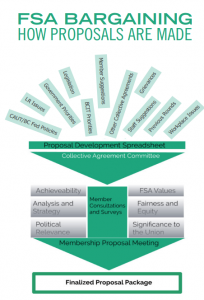
The Cycle of Negotiations
This piece was originally published in our the FSA Voice (January 2018 edition).
How many times have you heard, or maybe said, ‘I only pay attention to the union during bargaining’? It’s a common sentiment, and a common problem, in many unionized workplaces. Bargaining has the highest profile of all union activities. With collective agreements usually having a term of two to four years, long periods seem to pass when there is no bargaining to worry about. The reality is that any FSA member could be influencing the next round of bargaining right now.
The collective bargaining cycle never ends. For the FSA collective agreement expiring in 2019, the union’s preparations began before members ratified the agreement in 2015. In this case, the FSA Bargaining Team shared the dissatisfaction voiced by members over the lack of progress on PTS and applied research issues in the 2014-15 round of negotiations. The debate around ratifying that agreement began to position the FSA to make significant gains in those areas in 2019.
 Bargaining is a cyclical activity. Each round builds on what happened the round before. Ideas about changing the collective agreement that are rejected in one round come back to be considered again. The proposal might be rejigged or completely different approaches to an issue might be attempted based on what happened in the previous round. Each side comes to the table prepared to overcome arguments the other party made in the previous round.
Bargaining is a cyclical activity. Each round builds on what happened the round before. Ideas about changing the collective agreement that are rejected in one round come back to be considered again. The proposal might be rejigged or completely different approaches to an issue might be attempted based on what happened in the previous round. Each side comes to the table prepared to overcome arguments the other party made in the previous round.
Those changes and entirely new proposals develop from many sources on a continuous basis. The Canadian Association of University Teachers (CAUT) hosts a monthly teleconference with negotiators across the country to share ideas and information. Twice a year at CAUT’s general councils, member associations discuss and decide upon model clauses for a variety of collective agreement provisions relevant to academic workers.
Within the FSA, bargaining efforts are constantly underway at both the strategic and tactical levels. Strategic approaches empower the union to address whatever might arise in bargaining. Our decision to join CAUT and the BC Federation of Labour, our government relations work, our strike fund contributions, our member engagement work, our strategic planning process, all of these major activities build our strength and our ability to fend off concessions and make gains for members.
On a tactical level, collecting data and ideas to drive bargaining in 2019 also began during the previous round. As FSA members and staff identify issues with the collective agreement and ideas for improving our terms and conditions of work, FSA staff log them for consideration by our Collective Agreement Committee. The FSA’s labour relations team generates much of this information through their efforts to address member and union issues and through their professional understanding of how collective agreements are applied and interpreted. Grievances are particularly important sources of information for bargaining as they represent areas of dispute over the meaning of the collective agreement and provide for detailed investigation of the issues informing the dispute. Several collective agreement clauses originated from grievances that helped the parties see how the collective agreement was not meeting the needs of the workplace.
While FSA staff gather that information, they also keep an eye on our external environment for new ways to make gains for members. Changes in legislation, government priorities, and changes in BCIT’s priorities sometimes open up opportunities for improvements in the collective agreement that weren’t previously viable or even apparent. Going into negotiations, the Bargaining Team needs to understand where the employer can and cannot be made to move and what will motivate them to agree to change on certain issues.
No final package of proposals or single round of bargaining can solve everyone’s problems. And no round of bargaining can provide every improvement the FSA is fighting for on behalf of our members. With each cycle we make gains and with each cycle we work to ensure that your voices are heard. All of this couldn’t take place without the contributions of staff, members, and our greater community. We truly are stronger together.
Members Wanting a Better Collective Agreement Can Take Action at Any Time
- Email your proposal idea to fsa@bcit.ca and it will be submitted for consideration by the FSA Collective Agreement Committee
- If you have a good example demonstrating a workplace problem that might be solved in collective bargaining, submit that as well
- Use the fsa@bcit.ca address to let us know if you think the collective agreement is not being enforced: addressing these cases can result in improvements to the contract
- Come to FSA meetings and events and volunteer as a Tech Rep or join a committee: your involvement in these ways strengthens the union and gives us more chance to learn about your issues and your perspective
- Follow our newsletters, blog, and social media to understand how issues that will impact bargaining are unfolding
